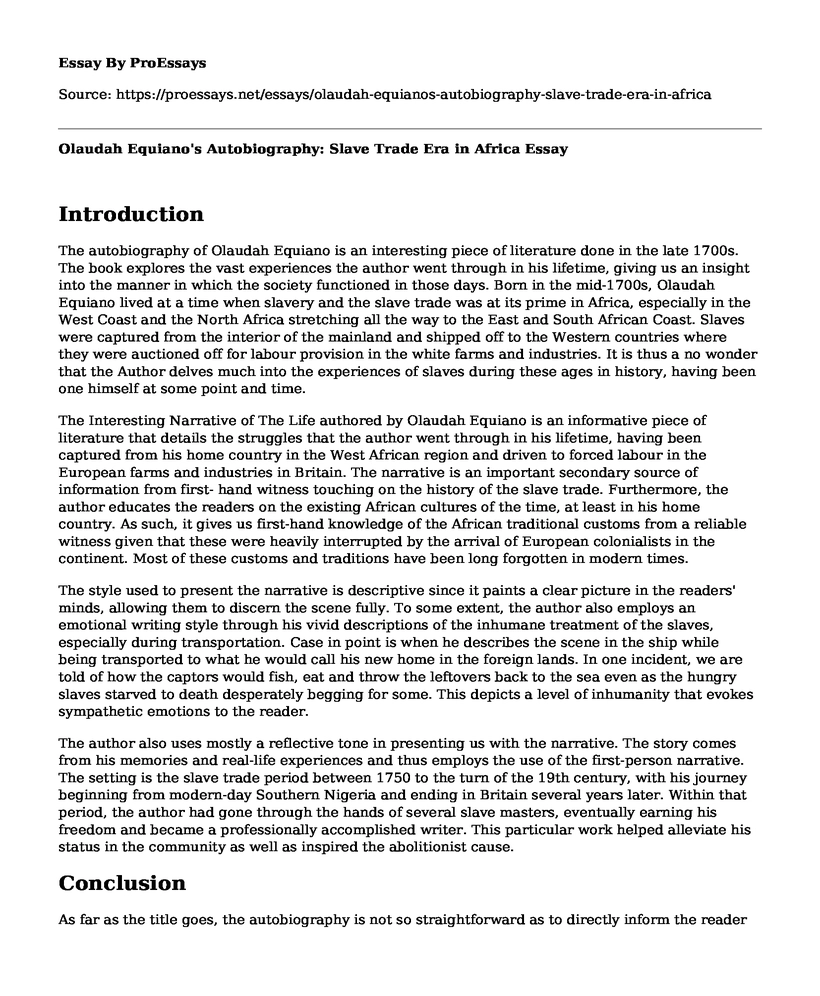Introduction
The autobiography of Olaudah Equiano is an interesting piece of literature done in the late 1700s. The book explores the vast experiences the author went through in his lifetime, giving us an insight into the manner in which the society functioned in those days. Born in the mid-1700s, Olaudah Equiano lived at a time when slavery and the slave trade was at its prime in Africa, especially in the West Coast and the North Africa stretching all the way to the East and South African Coast. Slaves were captured from the interior of the mainland and shipped off to the Western countries where they were auctioned off for labour provision in the white farms and industries. It is thus a no wonder that the Author delves much into the experiences of slaves during these ages in history, having been one himself at some point and time.
The Interesting Narrative of The Life authored by Olaudah Equiano is an informative piece of literature that details the struggles that the author went through in his lifetime, having been captured from his home country in the West African region and driven to forced labour in the European farms and industries in Britain. The narrative is an important secondary source of information from first- hand witness touching on the history of the slave trade. Furthermore, the author educates the readers on the existing African cultures of the time, at least in his home country. As such, it gives us first-hand knowledge of the African traditional customs from a reliable witness given that these were heavily interrupted by the arrival of European colonialists in the continent. Most of these customs and traditions have been long forgotten in modern times.
The style used to present the narrative is descriptive since it paints a clear picture in the readers' minds, allowing them to discern the scene fully. To some extent, the author also employs an emotional writing style through his vivid descriptions of the inhumane treatment of the slaves, especially during transportation. Case in point is when he describes the scene in the ship while being transported to what he would call his new home in the foreign lands. In one incident, we are told of how the captors would fish, eat and throw the leftovers back to the sea even as the hungry slaves starved to death desperately begging for some. This depicts a level of inhumanity that evokes sympathetic emotions to the reader.
The author also uses mostly a reflective tone in presenting us with the narrative. The story comes from his memories and real-life experiences and thus employs the use of the first-person narrative. The setting is the slave trade period between 1750 to the turn of the 19th century, with his journey beginning from modern-day Southern Nigeria and ending in Britain several years later. Within that period, the author had gone through the hands of several slave masters, eventually earning his freedom and became a professionally accomplished writer. This particular work helped alleviate his status in the community as well as inspired the abolitionist cause.
Conclusion
As far as the title goes, the autobiography is not so straightforward as to directly inform the reader about what to anticipate its contents. It, however, is suggestive enough to direct the reader to expect some historical material of value. The ending on its part is excellently done as the author reflects on the way life changed for him after gaining his freedom. The writer informs us that he felt luckier than his fellow brothers at home given the suffering and uncertainty they were still dealing with their everyday lives. Olaudah Equiano did a great job with this narrative, which is no wonder why it gained widespread acclaim across the sphere and made its contribution to the abolition of slavery and the slave trade.
Works Cited
Equiano, Olaudah, Olaudah Equiano, and Gustavus Vassa. The interesting narrative of the life of Olaudah Equiano. Alejandro's Libros, 2013.
Cite this page
Olaudah Equiano's Autobiography: Slave Trade Era in Africa. (2023, Feb 17). Retrieved from https://proessays.net/essays/olaudah-equianos-autobiography-slave-trade-era-in-africa
If you are the original author of this essay and no longer wish to have it published on the ProEssays website, please click below to request its removal:
- American History Questions and Answers Paper Example
- Essay Sample on Greek and Roman Ancient Art: Differences in Human Form & Meaning
- Missouri Compromise: The Prelude to Civil War in the US - Essay Sample
- The Vietnam War: An Epic War of Resistance 1954-1973 - Essay Sample
- Paper Example on Aus Mining Boom of the '60s-'70s: Impact on Real Per Cap Income & Commodity Prices
- Great Depression: Finding an Exit Strategy - Essay Sample
- Paper Example on Ancient Athens: Aristocratic Rule & Poor Oppression







